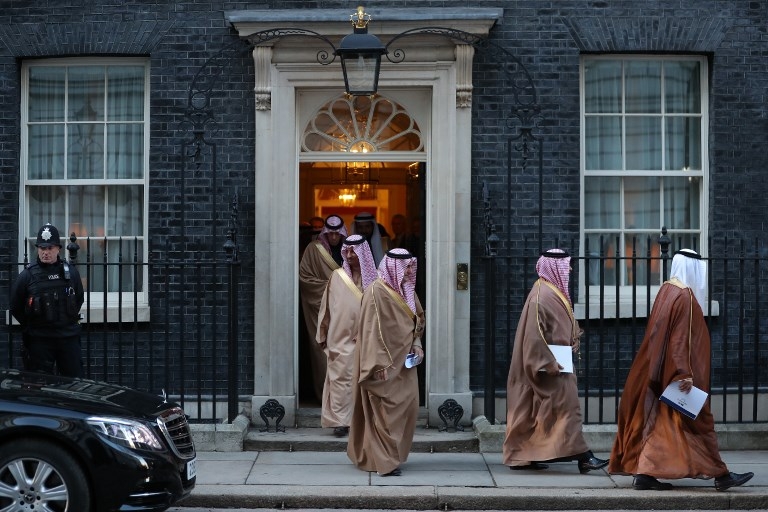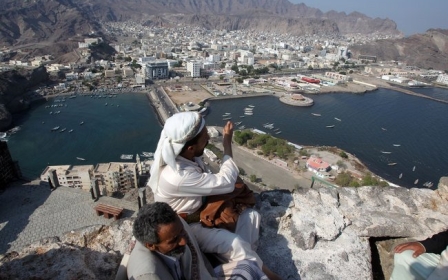UK accused of continuing 'business as usual' with Saudi Arabia after Khashoggi

The British government has been accused of continuing on “business as usual” with Saudi Arabia to score post-Brexit deals despite the murder of journalist Jamal Khashoggi in the kingdom’s consulate in Turkey earlier this month.
The accusation, delivered by Labour MP Ian Murray, came as UK Foreign Secretary Jeremy Hunt was grilled on Wednesday by the parliament’s Foreign Affairs Committee.
'At what point do we move off of business for usual and actually see that something has happened here that is completely and utterly abhorrent to our values and do something about it?'
- UK MP Ian Murray
The UK government, along with other Western governments that sell arms to partners in the Saudi-led coalition fighting in Yemen, has faced increasing pressure for supporting the coalition’s war in the wake of the journalist’s murder on 2 October.
Murray told Hunt that the public listening to his comments and those of UK Middle East Minister Alistair Burt this week would be “quite right to conclude that the UK government have said [it's] business as usual with the Saudi Arabians”.
“At what point do we move off of business as usual and actually see that something has happened here that is completely and utterly abhorrent to our values and do something about it?” asked Murray.
“Or is it the case that the UK government is so desperate for post-Brexit trade deals, that human rights are so low down the agenda that we would turn a blind eye?”
Hunt rejected Murray’s characterisation of the government’s position and, as he stated repeatedly over the two-hour session, said he would wait to find out “exactly what happened”.
“We’ve been very clear: if these reports turn out to be true, they are against our values and it will have an impact on the relationship with Saudi Arabia,” he said. “But we do need to wait and find out exactly what happened and be considered in our judgement.”
Ahead of the committee hearing, Hunt had told the BBC that the UK welcomed a call by the US to end the fighting in Yemen, adding that there was the chance to create a humanitarian corridor and head off a "terrible situation".
On Tuesday, US Secretary of State Mike Pompeo called for the end of the three-year conflict late on Tuesday, urging all parties, including US allies in the Saudi-led coalition, to end the fighting.
The UK has faced additional calls from humanitarian organisations to press for action over Yemen through the United Nations, where the country is the "penholder" with responsibility for Yemen on the Security Council.
David Miliband, a former British foreign secretary who is now chair and chief executive of the New York-based International Rescue Committee, called on the UK to seek a new Security Council resolution calling for a ceasefire.
Naser Haghamed, CEO of Islamic Relief Worldwide which has staff working in Sanaa and Hodeida, said: "Now is the time for all UN Security Council members to seize the chance and pass a new resolution on Yemen, calling for an immediate ceasefire and bring all warring parties to negotiate a meaningful and lasting solution to the conflict."
During Wednesday's hearing, Hunt suggested that the UK would push a UN resolution for a ceasefire in Yemen if UN Envoy Martin Griffith's plan led to a sustained cessation of hostilities in the country.
"No one would be more delighted than we would to be in a position to lay a resolution that meant that a ceasefire happened and held," he said.
"But at the moment, our judgement is just that it's a bit too premature. So we want to create the conditions for this US-backed, Martin Griffith's plan."
The Saudi-led coalition that intervened in Yemen’s war in 2015 has conducted frequent air strikes targeting the Iran-aligned Houthi group and has often hit civilians, although it denies doing so intentionally.
On Monday, the Armed Conflict Location & Event Data Project, an independent research group, reported that at least 56,000 people have been killed in armed violence in Yemen since January 2016.
The tally is more than five times higher than the 10,000 figure which has been regularly cited for the past two years.
New MEE newsletter: Jerusalem Dispatch
Sign up to get the latest insights and analysis on Israel-Palestine, alongside Turkey Unpacked and other MEE newsletters
Middle East Eye delivers independent and unrivalled coverage and analysis of the Middle East, North Africa and beyond. To learn more about republishing this content and the associated fees, please fill out this form. More about MEE can be found here.




